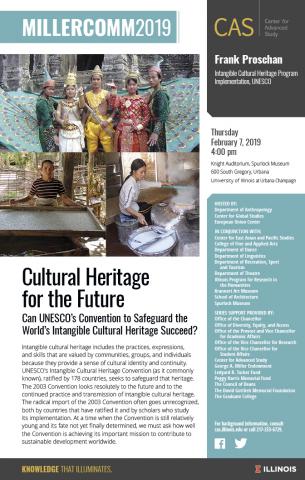Cultural Heritage for the Future: Can UNESCO’s Convention to Safeguard the World’s Intangible Cultural Heritage Succeed?
Knight Auditorium, Spurlock Museum
600 South Gregory
Urbana
Intangible cultural heritage includes the practices, expressions, and skills that are valued by communities, groups, and individuals because they provide a sense of cultural identity and continuity. UNESCO’s Intangible Cultural Heritage Convention (as it commonly known), ratified by 178 countries,seeks to safeguard that heritage. The 2003 Convention looks resolutely to the future and to the continued practice and transmission of intangible cultural heritage. The radical import of the 2003 Convention often goes unrecognized, both by countries that have ratified it and by scholars who study its implementation. At a time when the Convention is still relatively young and its fate not yet finally determined, we must ask how well the Convention is achieving its important mission to contribute to sustainable development worldwide.
Dr. Frank Proschan is an anthropologist and folklorist. From the 1980s, he collaborated with colleagues in Vietnam, Laos, Thailand and Cambodia in research and capacity building on languages, folklore, ethnology and museums. He worked at UNESCO between 2006-2015, where he was involved in the global implementation of the 2003 UNESCO Convention for the Safeguarding of the Intangible Cultural Heritage. He also has been a curator at the Smithsonian Institution and a research professor at Indiana University.
Hosted by: Department of Anthropology, Center for Global Studies, European Union Center
In conjunction with: Center for East Asian and Pacific Studies, College of Fine and Applied Arts, Department of Dance, Department of Linguistics, Department of Recreation, Sport and Tourism, Department of Theatre, Illinois Program for Research in the Humanities, Krannert Art Museum, School of Architecture, Spurlock Museum
Intangible Cultural Heritage Program Implementation, UNESCO

